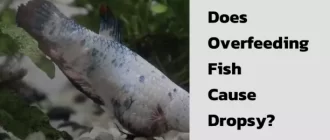Fish bloat is a common problem among aquarium fish, with potentially serious consequences if not addressed promptly. Fortunately, there are several effective ways to treat and prevent this condition, enabling our diminutive undersea companions to thrive in their watery homes.
What is Fish Bloat?

Fish bloat is a symptom rather than a disease in itself. This condition, also known as Dropsy or Malawi Bloat, is characterized by a severely swollen abdomen, often accompanied by other symptoms such as lethargy, loss of appetite and gasping for air.
Causes of Fish Bloat
Fish bloat arises from several different causes:
| Causes | Description |
|---|---|
| Diseases | Bacterial and parasitic infections can cause fish bloat. |
| Poor water quality | High levels of ammonia or nitrites lead to stress and illness. |
| Overfeeding | Overfeeding clogs fish’s digestive system and cause bloating. |
Steps to Treat Fish Bloat
Here are some steps that one can follow when trying to treat fish bloat:
- Isolate the Affected Fish: Remove the bloated fish from the main tank to prevent the spread of potential diseases to other tankmates.
- Check Water Quality: Test the water conditions in the tank using a water testing kit. Ensure levels of ammonia and nitrite are within acceptable ranges.
- Change Tank Water: Perform partial water changes to improve the quality of water.
- Medications: Medications like antibiotics or antiparasitic drugs may be effective, but should be used carefully under the guidance of a vet or an experienced pet store employee.
- Dietary Changes: Providing the affected fish a high fiber diet can help alleviate symptoms of bloat.
- Lowering Stress: Reducing stress can be key in treating and preventing bloat, as highly stressed fish are more prone to illness.
It’s essential to always consult with an aquatic veterinarian or a knowledgeable pet store employee for the most effective treatment options for your specific fish species.
Preventing Fish Bloat
Preventing fish bloat is easier than treating it. To do so:
- Maintain good water quality
- Don’t overfeed your fish
- Provide a balanced diet
- Regularly monitor your fish for signs of illness.
Remember, it’s vital to act quickly if your fish shows signs of bloat. Though it’s a common issue, prompt intervention can mean the difference between life and death for your aquatic pets.






